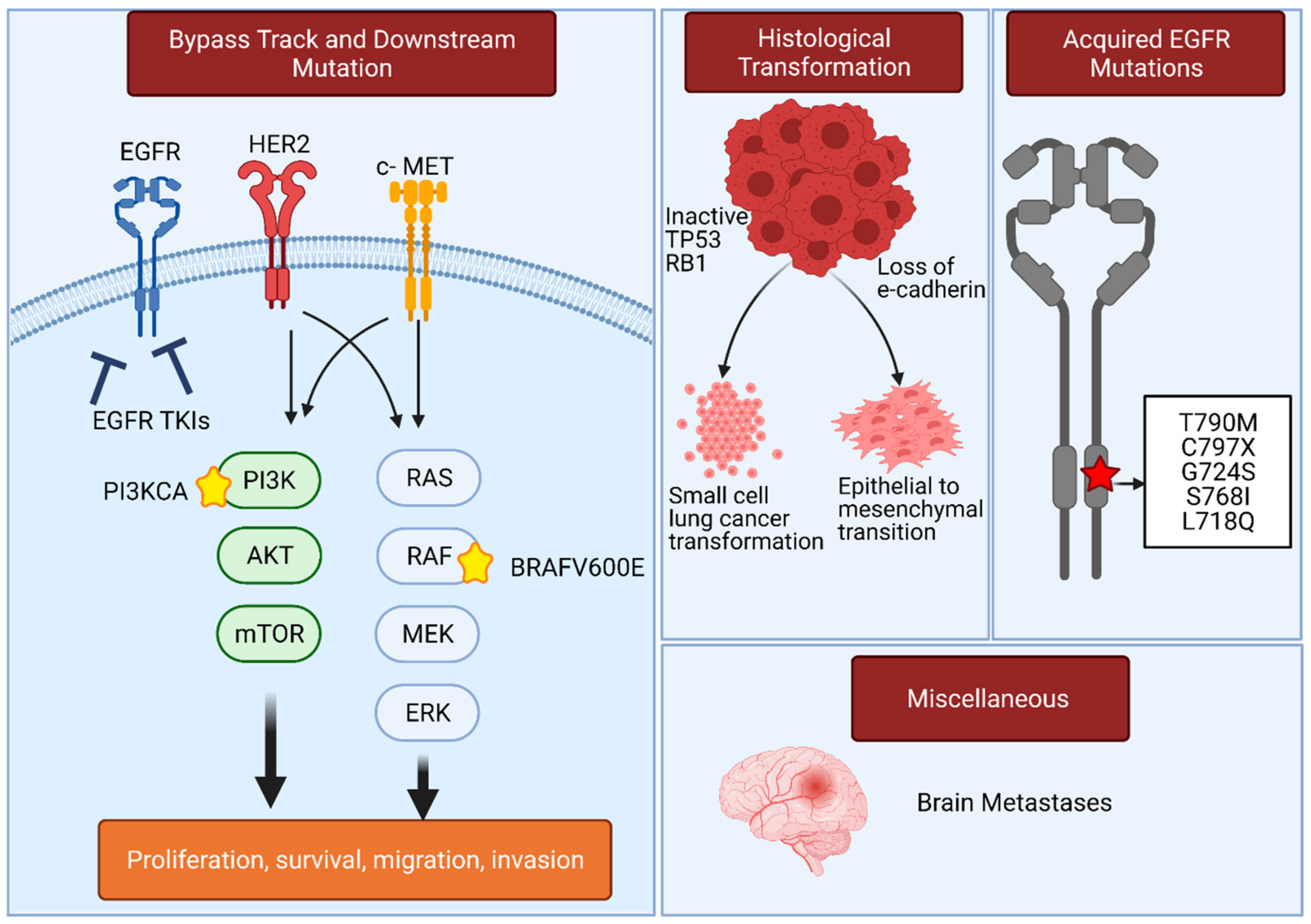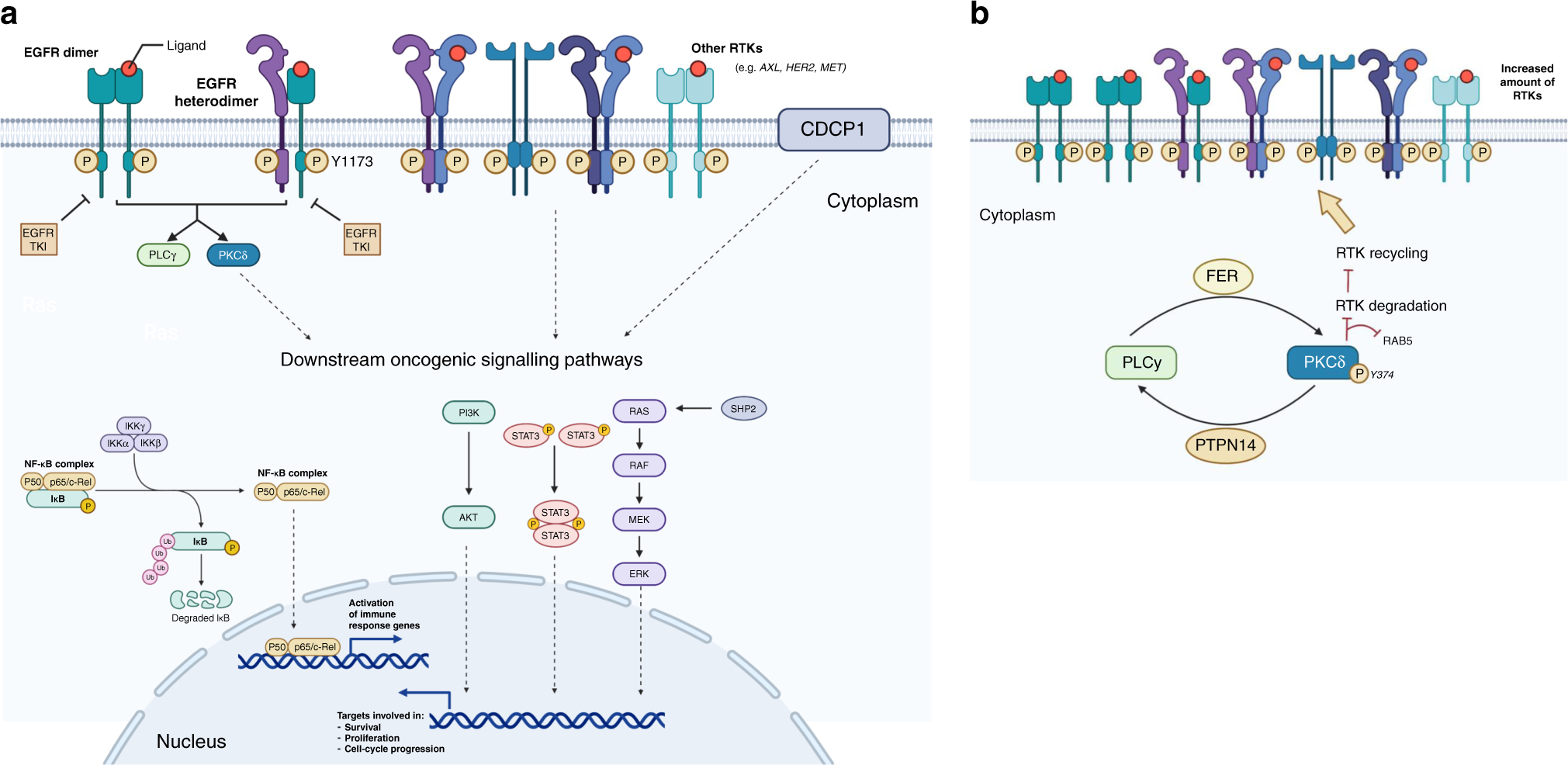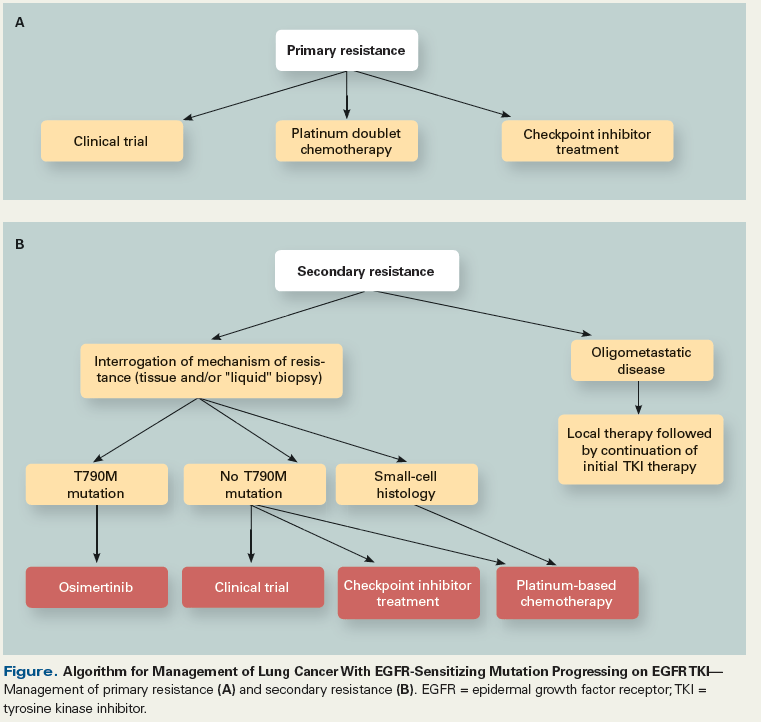An antidiabetic drug overcomes TKI resistance Resistance to epidermal growth factor receptor tyrosine kinase inhibitors EGFR TKIs is common among patients with lung cancer posing a great need for new therapies to overcome this resistance. The PI3K-Akt MAPK and NF-kappa B signaling pathways and AP-1 are involved in the upregulation of PD-L1 induced by different EGFR-TKI resistant mechanisms.

Cancers Free Full Text Targeting The Epidermal Growth Factor Receptor In Egfr Mutated Lung Cancer Current And Emerging Therapies Html
After TKI Resistance a Chemo-Antiangiogenesis Combination May Benefit Some Patients With EGFR NSCLC December 17 2021 Sara Karlovitch In patients with EGFR-positive nonsmall cell lung cancer who develop a T790M mutation after disease progression chemo-antiangiogenesis may prove beneficial.

Egfr tki resistance lung cancer. Optimal treatment for the various mechanisms of acquired resistance is not yet clearly defined except for the T790M mutation. The mechanisms of resistance to first-generation ie gefitinib erlotinib and second-generation ie afatinib. Additionally knockdown of NNMT suppressed p-Akt and tumorigenesis while re-expression of miR-449a induced phosphatase and tensin homolog PTEN and inhibited.
Currently there are no therapeutic options available for lung cancer patients who. Different mechanisms of acquired resistance to first-generation and second-generation EGFR TKIs have been reported. Lung cancer is the worldwide leading cause of death in patients with malignant tumors.
Overcoming EGFR-targeted TKI lung cancer resistance. Tumor growth was assessed in xenografts implanted with HCC827 GR. Afatinib is a second generation of EGFR TKI that showed great efficacy against tumors bearing the EGFR T790M mutation but it failed to show the improvement on overall survival of lung cancer patients with EGFR mutations possibly because of novel acquired resistance mechanisms.
EGFR-TKI resistant NSCLC cells with three well-known mechanisms c-MET amplification hepatocyte growth factor HGF and EGFR-T790M were investigated to determinate PD-L1 expression status and immune escape ability. Epidermal growth factor receptor tyrosine kinase inhibitor EGFR TKI represents a paradigm shift in the treatment of non-small cell lung cancer NSCLC patients and has been the first-line therapy in clinical practice. Cell proliferation and cell cycle assays was performed by IncuCyte real-time analysis and flow cytometry respectively.
Tyrosine kinase inhibitors TKIs have dramatically changed the clinical prospects of patients with non-small cell lung cancer harboring epidermal growth factor. Female patients have higher Mechanisms and management of 3rdgeneration EGFRTKI resistance in advanced nonsmall cell lung cancer Review. We found that acquired EGFR-TKI resistance promotes the immune escape in lung cancer by upregulating PD-L1 expression.
One major target for treatment with TKI is the epidermal growth factor receptor EGFR particularly in patients harboring activating mutations. Furthermore GRB2 knockdown decreased phosphorylation of EGFR and network pharmacology demonstrated that this was accomplished by targeting GRB2 30 31. The results of our research may partially explain the different PD-L1.
Epidermal growth factor receptor-tyrosine kinase inhibitors EGFR-TKI eg gefitinib and erlotinib targeting EGFR-activating mutations have prolonged progression-free survival in non-small cell lung cancer NSCLC patients Moreover a phase II clinical study. Herein we established EGFR-TKI-resistant non-small-cell lung cancer NSCLC models and observed a negative correlation between the expression levels of NNMT and miR-449a in tumor cells. The binding of phosphor-EGFR with the GRB2SOS1 complex sustains the activity of KRAS leading to EGFR-TKI resistance in lung cancer 27.
The constitutive signalling by EGFRvIII and the resistance to EGFR-targeted therapy are thought to be the consequence of structural changes in the EGFR protein that could affect the intracellular domain conformation and the ATP pocket23 It is present in 5 of analysed human lung squamous cell carcinoma SCC and has been associated with TKI resistance in vitro. A novel pharmacologically targetable metabolic mechanism driving resistance to epidermal growth factor receptor EGFR-targeting tyrosine kinase inhibitors TKIs has been identified in preclinical models of lung cancer in a Chinese study led by scientists at Shanghai Jiao Tong University School. Drugs targeting these mutations have been published such as third-generation EGFR TKIs.
PD-L1-deleted EGFR-TKIs sensitive and resistant cells were used to evaluate the immune escape ability of tumors in mice xenograft models. The development of tyrosine kinase inhibitors TKIs has revolutionized the treatment of EGFR -mutant nonsmall cell lung cancer NSCLC in recent years but new strategies are needed to overcome. Different mechanisms of acquired resistance to first-generation and second-generation EGFR TKIs have been reported.
Unfortunately patients with EGFR mutant lung cancer develop disease progression after a median of 10 to 14 months on EGFR TKI. The EGFR mutation was discovered as oncogenic driver in non-small-cell lung cancer NSCLC more than 15 years ago. Lung cancers harboring epidermal growth factor receptor EGFR mutations inevitably develop resistance to EGFR tyrosine-kinase inhibitors EGFR-TKIs.
Nonsmall cell lung cancer NSCLC constitutes 85 of all lung cancer cases 2. Unfortunately resistance universally develops on EGFR tyrosine kinase inhibitors TKIs after a median of 12 years on treatment. The purpose of this study was to evaluate the heterogeneities of glutamine metabolism in EGFR-TKI-resistant lung cancer cells and its potential as a therapeutic target.
Lung cancers harboring mutations in the epidermal growth factor receptor EGFR respond to EGFR tyrosine kinase inhibitors but drug resistance invariably emergesTo elucidate mechanisms of acquired drug resistance we performed systematic genetic and histological analyses of tumor biopsies from 37 patients with drug-resistant nonsmall cell lung cancers NSCLCs carrying. Therefore we sought to establish clinically relevant lung-cancer mouse models to achieve deep remission of cancers. Epidermal growth factor receptor EGFR is one of the most common driver genes in NSCLC.
Unfortunately patients with EGFR mutant lung cancer develop disease progression after a median of 10 to 14 months on EGFR TKI. It is known that all patients with mutant EGFR will ultimately generate resistance to EGFR TKI therapy after first or secondary generation EGFR TKI. Treatment with receptor-tyrosine kinase inhibitors TKIs has improved progression-free and overall survival in patients with advanced non-small cell lung cancer NSCLC.
Now four-generation EGFR TKIs targeting three-generation drug resistance drugs are also on the road.

Algorithm For The Management Of Egfr Mutated Non Small Cell Lung Cancer Download Scientific Diagram

Management Of Resistance To Egfr Tki Targeted Therapy Of Lung Cancer Lessons In Monitoring Cancer Evolution

Resiliency Of Lung Cancers To Egfr Inhibitor Treatment Unveiled Offering Opportunities To Divide And Conquer Egfr Inhibitor Resistance Cancer Discovery